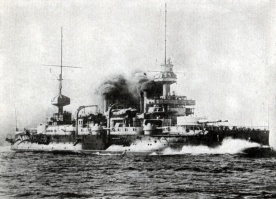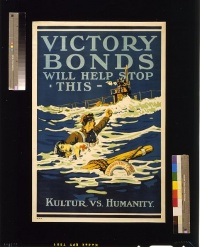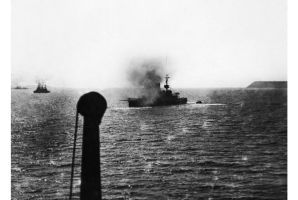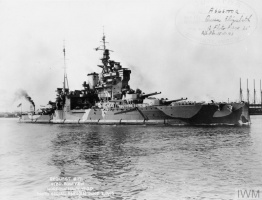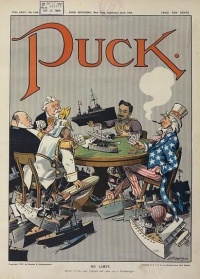Introduction↑
In a total war, in which both sides sought to exploit global resources, sea power was a key to victory. The concept of sea power began with Thucydides’ (c.460-c.395 BC) Peloponnesian War, where it served as a cultural and strategic contrast to military power. While most states use sea power strategies, a sea power is a state in which the sea dominates security, trade and identity. In 1914 the British Empire was the only sea power among the great powers; the rest were continental powers that viewed sea power as a strategy.
In 1911 Julian Corbett (1854-1922), the British naval historian and strategist, established British strategy as limited maritime warfare, attacking a European enemy’s economy and overseas possessions. He described sea power as the control of communications - the core definition of sea power. In 1890, Alfred Thayer Mahan’s (1840-1914) The Influence of Sea Power Upon History contended that naval dominance was the key to world power. This monograph helped shape Wilhelm II, German Emperor’s (1859-1941) Weltpolitik. Wilhelm’s new battle fleet challenged British naval mastery, helped lead to the Anglo-French Entente of 1904 and the Anglo-Russian Entente of 1907, and prompted a major arms race. Mahan’s argument that maritime economic warfare was decisive in defeating Napoleon influenced the Naval Race between Germany and Great Britain and British strategic thought. It prompted both radical ideas about collapsing the global economy in the event of war and more measured research into trade patterns and shipping routes, which shaped the later 1914-1919 war blockade.
During World War I↑
At the outbreak of war in 1914 Britain used its sea power to swiftly secure global communications and resources. German counter-measures were small-scale and short-lived. By December 1914 Chilean nitrates, Argentine beef, Australian wheat, American industrial production, and overseas manpower were accessible to the Allies and denied to Germany. Only the Black and Baltic seas were closed to the Allies. However, the rigour of the British economic blockade was initially limited by neutral - primarily American - protests. Consequently neutral Dutch, Danish and Swedish ports continued to trade with Germany. Diplomatic and legal concerns restricted the impact of British sea power. The Allied blockade of the Central Powers was carried out by Britain in the North Sea and the English Channel and by France (and later Italy) in the Mediterranean.
Faced with overwhelming British sea power, Germany resorted to the classic anti-sea power strategy: the destruction of commerce. German propagandists also revived Napoleonic claims about British oceanic tyranny, or "navalism", to counter British claims that Prussian "militarism" threatened world peace. Initially German cruisers abided by international law. However, in 1915 and again in 1917 they resorted to unrestricted submarine warfare, which, while effective in the short term, helped bring the United States into the conflict, making the blockade of Germany truly effective. The consequent reduction in the importation of animal fats and other vital raw materials to the Central Powers drove German strategy in 1918.
The other classic sea power strategy, projecting substantial amphibious forces, failed at Gallipoli in 1915. This led many to argue that modern developments in weapons, submarines, mines, artillery, and rail transport had weakened the offensive capabilities of sea power.
To be effective in the First World War sea power had to be applied to belligerent and neutral shipping, making the limits of sea power diplomatic rather than strategic. During the first three years of the conflict the United States contested the legal basis of British sea power and built a battle fleet to enforce the continental agenda of restricting the belligerent rights of sea powers. Economic warfare, based on naval blockade, was the only strategic asset that sea powers could use to counter continental military power. Although the United States joined the economic blockade of Germany in April 1917, the underlying clash of strategic cultures prompted a "Naval Battle" at Paris in 1919 over "Free Seas" and culminated in the Washington Naval Treaty of 1921-22. This Treaty limited world naval forces in both quality and quantity. Britain, as the only sea power empire, was gravely weakened by this treaty, while all major navies suffered from serious problems of under-capacity and obsolescence when war broke out in 1939.
Andrew Lambert, King's College London
Section Editor: Catriona Pennell
Selected Bibliography
- Bell, Archibald Colquhoun: A history of the blockade of Germany and the countries associated with her in the Great War, Austria-Hungary, Bulgaria, and Turkey, 1914-1918, London 1937: Her Majesty's Stationery Office.
- Corbett, Julian Stafford: Some principles of maritime strategy, Annapolis 1988: Naval Institute Press.
- Halpern, Paul G.: A naval history of World War I, Annapolis 1994: Naval Institute Press.
- Lambert, Nicholas A.: Planning armageddon. British economic warfare and the First World War, Cambridge; London 2012: Harvard University Press.
- Offer, Avner: The First World War. An agrarian interpretation, Oxford; New York 1989: Clarendon Press; Oxford University Press.





